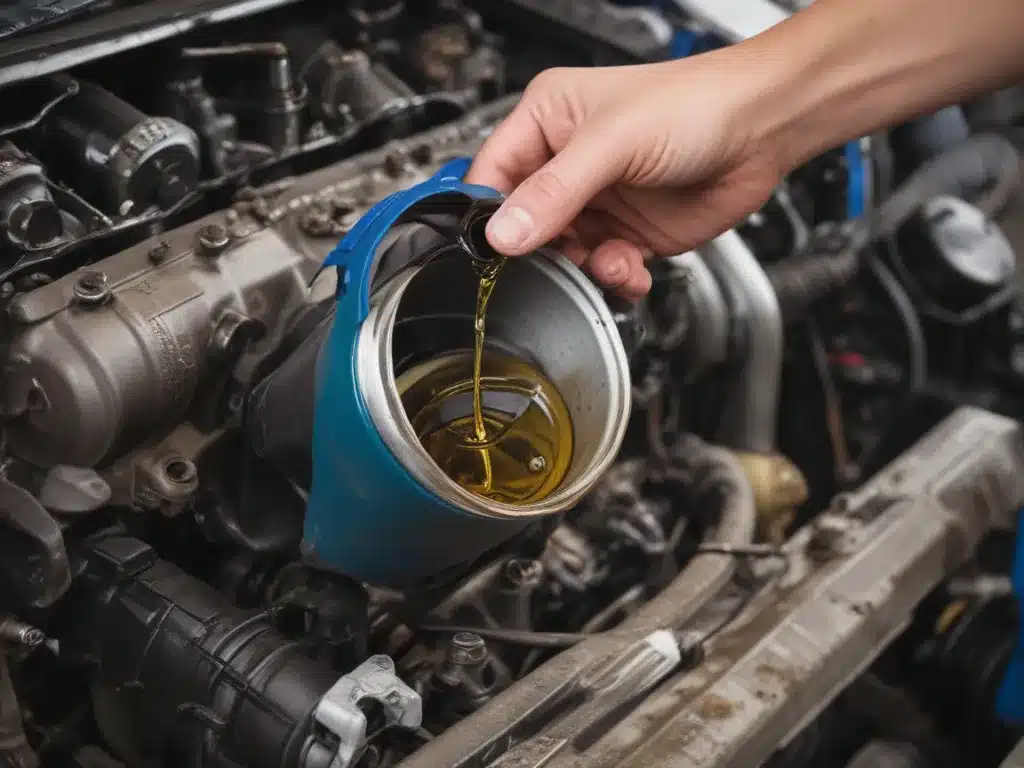
The Importance of Routine Maintenance
As a passionate car enthusiast, I can’t stress enough the importance of regular oil changes for maintaining the health and longevity of your vehicle’s engine. Think about it – your engine is the heart and soul of your car, the part that transforms the explosive power of combustion into the smooth motion that propels you down the road. Just like our own hearts, we need to take good care of our engines if we want them to keep chugging along for years to come.
Now, I know what you might be thinking – “Ugh, oil changes are such a hassle! Do I really have to do them that often?” Well, my friend, the answer is a resounding yes. Skimping on oil changes might save you a few bucks in the short term, but trust me, it’s a false economy that will come back to bite you. Neglecting this essential maintenance task is like refusing to change the oil in your body – eventually, everything starts to break down and seize up.
The Science Behind Oil Changes
Let’s dive a little deeper into the science behind why oil changes are so crucial. The oil in your engine serves a number of vital functions – it lubricates all the moving parts, reduces friction and wear, helps to cool the engine, and even cleans away any built-up gunk and deposits. Over time, however, that oil breaks down and becomes contaminated with all sorts of nasty stuff like metal shavings, dirt, and combustion byproducts.
Imagine trying to run your car with syrup instead of oil – it just wouldn’t work, right? Well, that’s essentially what happens when you let your oil get too old and dirty. It loses its ability to do its job properly, and all those metal parts start grinding against each other with increasing friction. This leads to accelerated wear and tear, and can ultimately result in catastrophic engine failure if left unchecked.
The Consequences of Neglected Oil Changes
I’ve seen it happen too many times – someone skips a few oil changes, and the next thing you know, their engine is knocking and sputtering, or even seizing up completely. And let me tell you, replacing a blown engine is not a cheap endeavor. We’re talking thousands of dollars in repair bills, not to mention the hassle of being without your ride for weeks on end.
But it’s not just the cost of the repair that you have to worry about. Neglecting your oil changes can also have some serious consequences for your car’s performance and fuel efficiency. As the oil degrades, your engine has to work harder to overcome the increased friction, which means it’s burning more fuel and producing less power. Suddenly, that zippy little sports car is chugging along like a lumbering old tractor.
The Benefits of Regular Oil Changes
On the flip side, keeping up with your recommended oil change schedule can work wonders for your engine’s longevity and performance. Fresh, clean oil ensures that all those moving parts are well-lubricated and protected from wear, allowing your engine to operate at peak efficiency. You’ll notice an improvement in acceleration, power, and even fuel economy – it’s like giving your car a shot of adrenaline!
And the best part? Routine oil changes are one of the most affordable and accessible forms of preventative maintenance you can do for your vehicle. Depending on your location and the type of oil your car takes, you’re usually looking at somewhere between $30 to $100 for a full oil change. Compare that to the thousands you’d have to shell out for a complete engine replacement, and it’s a no-brainer.
Choosing the Right Oil and Schedule
Of course, not all oil changes are created equal. It’s important to use the right type of oil that’s recommended for your specific make and model of car. Consult your owner’s manual or speak with a trusted mechanic to make sure you’re using the correct viscosity and quality level of oil.
As for the frequency of your oil changes, most manufacturers recommend changing it every 3,000 to 5,000 miles, or every 6 to 12 months – whichever comes first. But keep in mind that this is just a general guideline, and your mileage may vary (pun intended) depending on your driving conditions and habits. If you do a lot of stop-and-go city driving, tow heavy loads, or frequently operate in extreme temperatures, you may need to change your oil more often.
Putting It All Together
At the end of the day, regular oil changes are one of the most critical and cost-effective maintenance tasks you can perform on your vehicle. By keeping your engine well-lubricated and clean, you’re not only extending its lifespan, but also maintaining peak performance and fuel efficiency. It’s a small investment of time and money that pays huge dividends down the road.
So, the next time you’re tempted to put off that oil change, just think about the alternative – a costly engine rebuild or even a complete replacement. Trust me, it’s just not worth the risk. Embrace your inner car-care enthusiast, and make oil changes a regular part of your automotive routine. Your engine (and your wallet) will thank you.
And if you’re in the market for a professional, reliable oil change service, be sure to check out AutoOilAndFluid.com. Their team of experienced technicians will have your car running like new in no time. Happy motoring, my friends!


